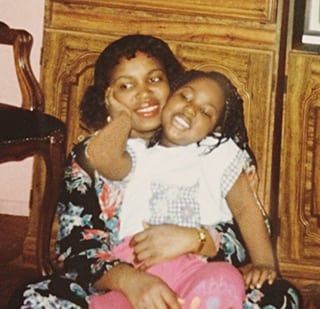Inside NYP: Danica Dorlette
Childhood bronchitis brought on by difficult living conditions prompted this oncology nurse to pursue a career caring for others.


Whenever someone asks me where I grew up, I always say Bushwick, a working-class neighborhood in northern Brooklyn.
But some of my earliest memories are from Canarsie, another Brooklyn neighborhood, where my mother rented an apartment in a two-family home. I was only 2 at the time, but I remember summer evenings chasing ice cream trucks and playing in the backyard with the landlord’s two children.
I can also recall that things took a turn for me that winter. I developed a bad cough, and I remember complaining that my “belly felt hot,” and spending nights sweaty and unable to sleep. That December, I was diagnosed with bronchitis, a condition that plagued me for the next six years.
What I don’t remember is the constant dampness, or how my mother had to buy buckets to catch the water leaking from the ceiling. Nor do I recall the mold that grew, or how my mother’s eyes became irritated from constantly using bleach to remove it when her pleas to the landlord were ignored. When the first snowfall came and there was no heat, we fled those dreadful conditions. For our health and well-being, my mother moved us to Bushwick before the year ended.
My mother is from Haiti, and after being brought to the U.S. by my great-aunt, she worked as a home health aide. That was my introduction to seeing the art of caring for another person. When there was no one to watch me when I was very young, I would go to work with her. Some of her clients became like grandparents to me and would help me with my homework. Watching my mother care for others taught me that compassionate, personalized care is essential in promoting health.
Today, I work as an oncology nurse on the Bone Marrow and Stem Cell Transplant Unit at NewYork-Presbyterian/Weill Cornell Medical Center. Our patients stay for about three or so weeks at a time, so I get to know them well. I learn so much from my patients. If someone is fighting for their life, they have a new perspective on what life really is, and they help me appreciate mine even more. A lot of the patients want to know what’s going on in your life and share their own stories. It’s these human moments that are so rewarding.
I’ve had many other moments in my life that made me want to be the person supporting a patient and their family, whether they are getting the best news of their life or the worst. When I was 19 my grandmother was very sick, and I learned how great NewYork-Presbyterian was. I said to my family, “You know what? People are coming from other countries and other states for care here. We can cross the bridge and we can go to Manhattan.”
NewYork-Presbyterian was the only place that took my family and me seriously, and discovered a blood clot in my grandmother’s lung. My grandmother ended up passing away from a pulmonary embolism, but the compassion and the care were so special. We felt so comforted by the nurses, the medical team, the techs, the clerks — everyone. Everyone takes their role seriously. I was in nursing school at the time and I thought, “This is the place I want to be.”
“I learn so much from my patients. If someone is fighting for their life, they have a new perspective on what life really is, and they help me appreciate mine even more. ”— Danica Dorlette
When I graduated, I was invited to a recruiting event where we met assorted nurse managers and learned about their departments. Everyone flocked to the emergency department table, and I looked over and saw that the oncology table was open. I ended up spending the majority of the time speaking with the nurse manager and left thinking how the things I love about being a nurse were compatible with oncology. I applied to be placed in the oncology unit. It was surreal when I got the job — my mom was jumping around.
The thing I love about nursing is that you can make a difference in someone’s life, simply by sharing human moments together. I was trained as a vocalist, and one day a patient seemed like he was giving up. My co-worker told him that I would sing a song for him. The young man wanted me to sing “Part of Your World” from The Little Mermaid. I went in that night with his medications and word got around that I would be singing, so some of the nurses and unit clerks came in to watch. He was so happy, and seemed to be able to forget why he was there and enjoy the moment.
Times likes these are why I chose nursing. My mother wanted me to become a physician and was surprised when I chose to become a nurse. But I said, “It’s because I see what you do and I want to be that person for someone else. I saw what the nurses did for Grandma. I saw what her nurses did for the rest of our family.” They became my heroes.

Danica Dorlette, age 5, with her mother, Willianie Seide
Photo courtesy of Danica Dorlette
I never forgot the struggles my mother and I faced when I was young, and I want to be an advocate for people in similar situations. I just graduated with my master’s in public health from Emory University, with a focus in prevention science. I completed an internship with WE ACT for Environmental Justice, working with community residents in a housing project in Inwood in Manhattan, who are dealing with a variety of indoor environmental quality issues similar to the ones my mom and I faced.
Now that I’ve graduated, I’m looking forward to devoting more time to the community, public health advocacy, and environmental justice — a field that addresses how communities of color and low-income communities don’t always have the best environmental factors to foster healthy lives. The experience my mother and I had at that first apartment was hardly unique — but our solution was. Not everyone can leave the way we did. There are myriad factors that tie families to where they live, despite how unsafe or unhealthy conditions may be. Not every child can find a safe place to grow, and I want to help change that.
Danica Dorlette, R.N., is an oncology certified nurse on the Bone Marrow and Stem Cell Transplant Unit at NewYork-Presbyterian/Weill Cornell Medical Center. She has a master’s in public health from Emory University and is a public health advocate with experience working alongside national government, state, and grassroots agencies. She thrives in collaborative environments where the goal is to provide quality care – whether to individuals or whole populations of people. She is interested in creating transformative and creative health policies and programs to meet today’s health challenges.

